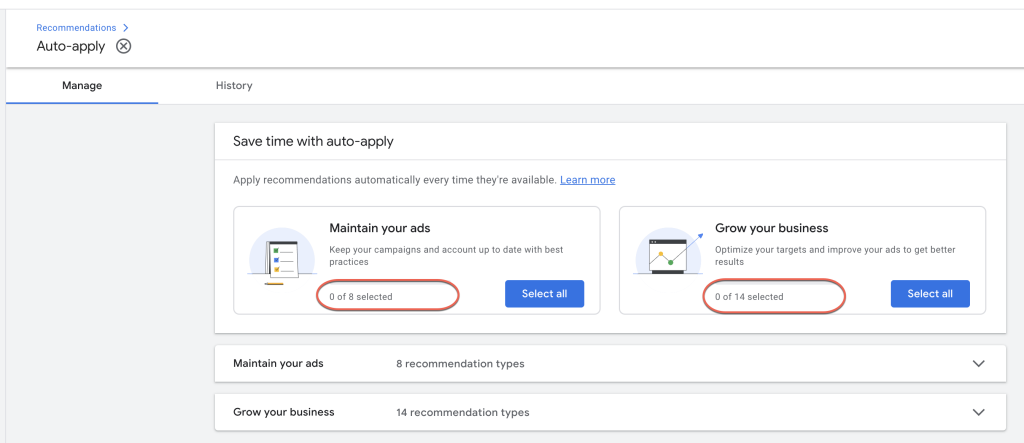In past years (2015 and 2021 specifically), I’ve written about the myths that surround Google advertising.
Surprisingly (and somewhat dishearteningly) many of these myths continue to circulate.
In 2015, for example, I wrote about these five myths:
- You don’t need ongoing Google Ads management
- Google Ads can save a dying business
- Google knows best
- Results happen right away
- Google Ads is too expensive
Then, in 2021, I expanded on these four myths:
- Google advertising doesn’t work when the decision is long and/or emotional
- Google advertising only works in the short-term
- You should pause any campaign, ad group, or keyword that isn’t converting well
- Google Ads is too expensive (again!)

Sadly, many inexperienced advertisers continue to think that Google advertising is easy, they can take every recommendation that Google makes at face value, and Google Ads will solve all their business problems.
Meanwhile, in the opposite camp, skeptical advertisers believe that Google advertising has limited utility and is too expensive to even test.
All not true!
Still, if I had to narrow it down, I’d say that three myths remain more prevalent and are harder to shake than any of the others:
Myth #1: Anyone can manage your Google Ads program
Many professionals in fields of expertise that are adjacent to PPC will offer paid search advertising as an add-on service. But paid search is so complex, and changes so continually, it needs to be their sole focus and not something they offer on the side.
So instead of asking your PR consultant, web designer, or SEO specialist if they can manage your Google Ads program, ask instead if they have a PPC specialist on their team or partner they can recommend.
In short, if you want to succeed with your Google advertising—and save yourself time and money over the long term—hire an experienced, specialized Google Ads advertising agency from the start.
Myth #2: Everything is automated, so management is easy
True, Google Ads has rolled out a lot of automated features over the past few years.
And, technically, you could just let these automations take over your account.
But I can safely predict that it won’t take long for you to either pause all your campaigns or run out of budget—whichever comes first.
This isn’t a slight against Google automation, exactly. Google automation can be very useful when used judiciously. But you can’t allow it to run untested and unchecked.
You NEED a Google Ads advertising expert to manage Google Ads automation to avoid major issues, especially bidding and messaging.
Issues with automation bidding
Bidding automation in Google Ads works well in general. But you still need a human being to manage the strategy part of it.
Because Google Ads won’t know when you change your business goals. Or when you have a new product or service offering. Or when new competitors come into the market.
All of these changes require you to rethink and adjust your bidding strategy. And that can only come from a person (not automation) who can see the bigger picture and put those new strategies in place.
Problems with automated messaging
Similar problems can arise from automated messaging.
Your ad messaging needs to align with your brand and encourage prospective leads to take the action you want them to take. The risk of getting your messaging wrong is that you’ll lose leads—or even turn off prospective customers entirely.
It’s just too important to hand off to an algorithm.
Unfortunately, not everyone has gotten the message. If you spend some time Googling around, it’s not hard to find examples of messaging gone wrong—and I bet that most of these errors are problems with automation.
For example, when we audited competitor ads for one of our clients, we found that one competitor had Google ads that were strangely “off” and in some instances ultra-specific. In fact, the ultra-specific messaging promoted a supplemental service line that was an add-on to their flagship product. It was a weird choice and probably not an intentional strategy. I’m confident it was an automation issue.
We’ve also seen ads where the headlines, descriptions, and assets (extensions) don’t align. The headline promotes one service, the description talks about another, and the extensions refer to something else entirely. Google has improved on this lately, but we still see issues—such as Google pulling messaging from gated web content!
Sometimes new clients will tell us that they’ve spent hours troubleshooting their ads. They can’t figure out why ads for old products keep mysteriously appearing when all of their self-created messaging looks good. When we dig deeper, we find that they have automated messaging turned on, which is what produced those obsolete ads.
This is why one of the first things we do for new clients is turn off automated messaging. It’s easy enough to do—if you know where to look (and Google hides it really, really well!).
Myth #3: You can safely follow Google recommendations
Some of the most dangerous Google Ads automations are those in-platform recommendations that are supposed to help you optimize your account. (Google’s off-platform recommendations are questionable too, but that’s another story.)
Google assigns an optimization score, which ranks from 0 to 100, depending on how many of their recommendations you’ve implemented. You can apply many of these recommendations easily, with the mere click of a button.
But here’s the problem: these “optimizations” may run contrary to your business goals.
By definition, Google’s recommendations are generic. Their AI can’t take into account your business and goals, market changes, new competitors, etc. Typically, their recommendations turn out to be a great way for you to spend more on the platform, but they aren’t always great for helping you do what you want to do.
Therefore, as a blanket rule, we recommend not implementing ANY of Google’s recommendations for a perfect optimization score:

Venturing down the “recommendations” rabbit hole is too risky and time-consuming.
You’ll end up having to back out just as quickly as you dive in and will be no closer to understanding what was a good optimization for you—and what wasn’t.
Let’s put these myths to rest—finally!
Don’t let these PPC myths take you off course. Instead, save yourself time and headaches by partnering with an experienced, specialized Google Ads marketing agency from the get-go.
Contact us to set up a call.






